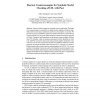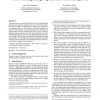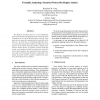120
Voted
CAV
2004
Springer
15 years 8 months ago
2004
Springer
The counterexamples produced by model checkers are often lengthy and difficult to understand. In practical verification, showing the existence of a (potential) bug is not enough: ...
100
Voted
ATAL
2004
Springer
15 years 8 months ago
2004
Springer
We introduce a Game Logic with Preferences (GLP), which makes it possible to reason about how information or assumptions about the preferences of other players can be used by agen...
99
Voted
TACAS
2005
Springer
15 years 8 months ago
2005
Springer
Shorter counterexamples are typically easier to understand. The length of a counterexample, as reported by a model checker, depends on both the algorithm used for state space explo...
108
click to vote
AUSAI
2005
Springer
15 years 8 months ago
2005
Springer
We model the well-known Sum-and-Product problem in a modal logic, and verify its solution in a model checker. The modal logic is public announcement logic. The riddle is then imple...
137
Voted
IEEECIT
2005
IEEE
15 years 8 months ago
2005
IEEE
We report on a case study in which SAL model checkers have been used to analyze the Suzuki-Kasami distributed mutual exclusion algorithm with respect to the mutual exclusion prope...
101
Voted
ERLANG
2006
ACM
15 years 8 months ago
2006
ACM
We present the new model checker McErlang for verifying Erlang programs. In comparison with the etomcrl tool set, McErlang differs mainly in that it is implemented in Erlang. The ...
110
click to vote
SEW
2006
IEEE
2006
IEEE
Model Checking of Software Components: Combining Java PathFinder and Behavior Protocol Model Checker
15 years 8 months ago
Although there exist several software model checkers that check the code against properties specified e.g. via a temporal logic and assertions, or just verifying low-level propert...
119
Voted
ASWEC
2006
IEEE
15 years 8 months ago
2006
IEEE
The Kerberos-One-Time protocol is a key distribution protocol promoted for use with Javacards to provide secure communication over the GSM mobile phone network. From inspection we...
147
Voted
FMICS
2007
Springer
15 years 9 months ago
2007
Springer
Abstract. In this paper we present an action/state-based logical framework for the analysis and verification of complex systems, which relies on the definition of doubly labelled...
100
Voted
FMCAD
2007
Springer
15 years 9 months ago
2007
Springer
—We show how to verify the correctness of transactional memory implementations with a model checker. We show how to specify transactional memory in terms of the admissible interc...



